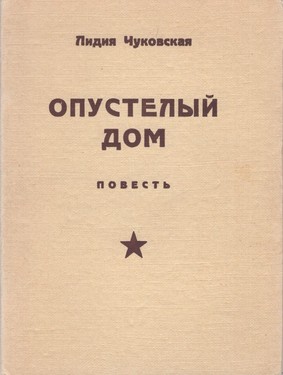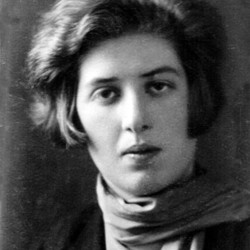Среди вороха мемуаров, воспоминаний, наконец, – жемчужное зерно: книга Лидии Чуковской «Опустелый дом».
В стиле мопассановской La Vie d’une Femme восстает перед читателем отрезок жизни матери, вдовы в смутные советские времена конца 30-ых годов. Ольга Петровна смотрит на события с обывательской, практической точки зрения, и правда этой обыденности ущемляет сердце.
Ольга Петровна верит в советскую власть, даже если не так действенно и сознательно, как ее сын Коля, изобретатель и комсомолец. Когда увольняют с работы беспартийную Наташу, Ольга Петровна как-то частично винит молодую девушку, хотя и защищает свою подругу по мере сил на общем собрании месткома. Когда на работе арестовывают обожаемого ею директора, Ольга Петровна ошеломлена – как же он может быть вредителем, он казался таким, как все, только симпатичнее.
Когда же, неизвестно почему, арестован и сослан ее сын, Ольга Петровна цепляется за последнюю уверенность: это ошибка. Ведь тут и малейшей мысли не может быть, что Коля вредитель, уж это она точно знает. Вот друг его, Алик, которого тоже арестовывают, тот резкий. А в колином случае – ошибка, скоро будет исправлена. И Ольга Петровна пишет Сталину. Личные письма. В собственные руки.
Она ждет «разъяснения этого чудовищного недоразумения», ждет возвращения сына, уверив себя самое в конце концов, что его уже выпустили. Колино письмо из ссылки разбивает все ее иллюзии: «мамочка, следователь Руднев бил и топтал меня ногами…».
В книге «Опустелый Дом» (издана без ведома автора издательством «Пять Континентов») Чуковская не жалуется, не причитает, не пропагандирует, не философствует. Она свидетельствует. Как ни называть этот жанр, из-под ее пера вышло прежде всего художественное произведение, захватывающее простотой, прямотой и правдой.
Among the heaps of memoirs and reminiscences, a pearl is finally found – Lydia Chukovskaia’s “The Deserted House.”
Written in Maupassant-like style of La Vie d’une Femme, it dives into the life of a mother, a widow living in the Soviet times of trouble in the late 1930s. Olga Petrovna looks at the events from a philistine, practical perspective, and the truthfulness of her sincere naivety makes one’s heart ache.
Olga Petrovna believes in the Soviet regime, even if she does so not as actively and consciously as her son Kolya, an inventor and Komsomol-member. When Natalia, who is not a member of the party, is fired from her job, Olga Petrovna somehow partially puts the blame on the young woman, although she does come to her defense to the best of her abilities at the local committee meeting. When her boss, whom she worships, is arrested, Olga Petrovna is stunned: how can he possibly be an enemy? He appeared to be like everyone else, only better.
However, when her son is arrested and exiled for no known reason, Olga Petrovna grasps onto the last possible certainty: it is a mistake. For there cannot possibly even be a thought that Kolya is an enemy, she knows it better than anyone else. As for his friend Alik, who is also arrested, it’s true he could be very edgy. But in regards to Kolya, it must be a mistake that will soon be corrected. So Olga Petrovna writes to Stalin. These are personal letters. To be delivered to Stalin directly.
She awaits “a clarification of this horrible misunderstanding,” she waits for her son to return, at the end of the day having assured herself that he has already been released. Kolya’s letter from exile shatters all her illusions: “Mom, investigator Rudnev kicked and stomped me…”
In “The Deserted House” (published by “Librairie des Cinq Continents” without the author’s knowledge), Chukovskaia does not complain or lament, she does not propagandize, nor philosophize. She bears witness. However one classifies this genre, what she wrote is above all a work of fiction, gripping with its simplicity, straightforwardness, and truth.



